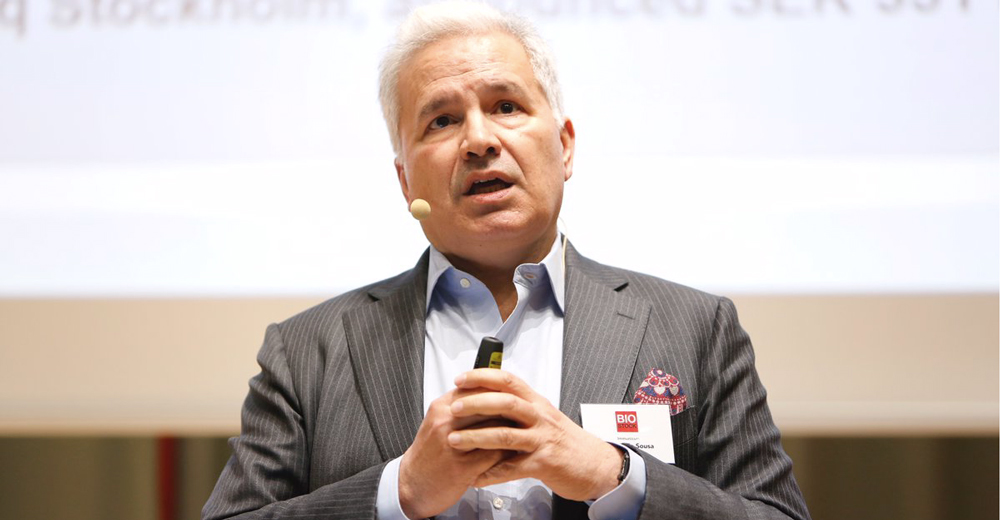
Ultimovacs on track to phase II readout
Cancer vaccines are quickly gaining popularity in the international biotech community, especially since household names like Moderna and BioNTech have stepped into the ring. Norwegian biotech Ultimovacs is poised to ride this wave of momentum as it approaches phase II readouts with its universal cancer vaccine UV1. BioStock spoke with CEO Carlos de Sousa to hear about the progress made in Q4 2022, and how UV1 could rival personalised mRNA vaccines.
Cancer immunotherapies have risen in popularity thanks to their ability to harness and stimulate a patient’s immune system to help it circumvent tumour resistance mechanisms. Immune checkpoint inhibitors are a prime example. However, their benefits are still marginal in many patients, and cancer remains one of the top causes of death globally.
To fill this gap, researchers have been looking to one of the oldest and most successful forms of immunotherapy – vaccines. The idea of inducing an immune response by exposing the body to a target antigen to prevent severe disease has existed for hundreds of years. However, until recently, finding cancer-specific antigens has been a major challenge due to the nature of how cancer expresses itself differently in each individual. Read more about cancer vaccines here.
Rising popularity of cancer vaccines
During the Covid-19 pandemic, biotechs like BioNTech and Moderna shot to prominence with their mRNA covid vaccines. Now, both companies are aiming to mirror the success of their technology in the oncology field.
Last autumn, Moderna announced reaching the primary efficacy endpoint in a phase IIb study with its personalised cancer vaccines mRNA-4157/v940. The vaccine is being evaluated in combination with Merck’s checkpoint inhibitor Keytruda (pembrolizumab).
Then, in January this year, the British government announced that it was partnering with BioNTech to enrol as many as 10,000 patients in trials of a new mRNA cancer vaccine. According to the BioNTech founders, cancer vaccines could become widely available by 2030.
Ultimovacs’ own cancer vaccine
Meanwhile, in Norway, immune-oncology company Ultimovacs is developing its own cancer vaccine technology. Compared to the likes of Moderna’s or BioNTech’s vaccines, which are both personalised – specific to each patient – Ultimovacs’ candidate UV1 is considered universal. This is because UV1 utilises an enzyme called telomerase as an antigen, which is expressed in around 90 per cent of all tumour cells.
Ultimovacs has a broad clinical programme exploring the impact of UV1 in multiple cancer types and in combination with checkpoint inhibitors like Keytruda. Two of the five phase II trials with UV1 have completed patient recruitment. In the company’s 2022 year-end financial report, CEO Carlos de Sousa states that topline data are expected from these trials during the first half of 2023. The INITIUM trial is in metastatic malignant melanoma and the NIPU trial is in metastatic pleural mesothelioma.
»The results from these two trials represent potentially transformative milestones for Ultimovacs and cancer patients with unmet medical needs and will provide important guidance for the regulatory pathway for UV1.« — Carlos de Sousa, CEO Ultimovacs
Patient recruitment going strong
The other phase II trials FOCUS, DOVACC and LUNGVAC are also recruiting steadily. Overall, Ultimovacs expects to enrol more than 650 patients at nearly 100 clinical centres across 15 countries.
During the fourth quarter, Ultimovacs also completed enrolment in the TENDU study in prostate cancer. The trial is evaluating Utlimovacs’ technology platform, TET (Tetanus-Epitope Targeting). Read more about this platform here. The results from this study are expected in the second half of 2023.
Convincing biomarker data
In the Q4 report, de Sousa also reiterates the importance of the three-year survival data from the completed phase I study in metastatic malignant melanoma. The biomarker analysis from the UV1-103 trial shows that UV1 induces increased efficacy also in patients less likely to respond to monotherapy with pembrolizumab in hard-to-treat tumours. These results strengthen the case for UV1 as a combination treatment even further. BioStock spoke with the company’s Director Medical Affairs Espen Basmo Ellingsen to get a deeper reading on the results. Read the interview here.
Comment from the CEO
To learn more about the significance of the advancements made during Q4, BioStock got in touch with Ultimovacs’ CEO Carlos de Sousa.
Carlos, how high is the anticipation for the first phase II data readouts?
– Interest in our Phase II data has been growing in momentum in recent months. Cancer vaccines are really one of the hot topics on the immunotherapy agenda this year, after decades of headwinds. The results may be much bigger than Ultimovacs alone: significant efficacy from UV1’s Phase II program, could be a breakthrough for universal vaccines as a therapeutic approach. Positive readouts could lead to a new class of cancer treatments to benefit patients with significant unmet medical needs.

Which readout do you find most important for Ultimovacs, and why?
– At Ultimovacs, our focus is to address major unmet needs for patients with solid tumours and as such no one trial is more important than another. INITIUM is run in-house and in our lead indication malignant melanoma. Importantly, we have conducted two previous Phase I studies in this indication with encouraging results, leading to Fast Track and Orphan Drug Designation from the FDA. If the results are positive, we are prepared – with support from the INITIUM Medical Advisory Board – to move forward with further clinical trials towards approval. The investigator-initiated trials are also very important to us because they also address diseases with high unmet medical need. These studies are initiated by specialists who believe in the potential of UV1 to deliver a meaningful clinical benefit for their patients. Again, the team at Ultimovacs is driven by bringing benefits to patients and as such, we are optimistic about all five Phase II studies.
Moderna sparked excitement with the announcement of positive phase II results with its mRNA vaccine candidate. What are your thoughts on the results?
– We are of course delighted with Moderna’s ambitions in the cancer space, as it can bring increased options for patients and Ultimovacs can also benefit from increased attention on cancer vaccines. The Moderna Keynote-942 trial, aiming to reduce the risk of recurrence in malignant melanoma patients after surgery, is in a very different patient group than those in our Phase II studies. The patient population in INITIUM has advanced or metastatic malignant melanoma, meaning surgery is not an option. We need several solutions to address different patients’ needs, and we welcome every therapy that can improve cancer treatment.
How does UV1 differentiate itself from not only Moderna’s candidate, but personalised cancer vaccines in general?
– Personalised Cancer Vaccines (PCV) and universal approaches, like UV1, have much in common: We develop an immunotherapeutic vaccine which mobilises the patient’s immune system to fight cancer with support from a checkpoint inhibitor. The main difference is that PCVs are tailor-made to each patient, or a small group of patients based on a tumour biopsy. This procedure takes some time and increases complexity and cost. A universal approach like UV1 is ready to use, meaning time to initiation of treatment can be shortened. Ease of access is also one of the key attributes of UV1. As treatment is administered intradermally, patients can be treated in community centres without the need for complex hospital infrastructures. Since UV1 targets telomerase present in 85-90 per cent of cancer types across all stages, there’s no need for biomarker screening or biopsy of the tumour. It’s often crucial to start treatment as soon as possible and not waste any time if the cancer is aggressive, and the ease of use makes UV1 potentially attractive also in earlier stages of the disease.
Does the biomarker data from the phase I study with UV1 in melanoma patients reinforce this point?
– The UV-103 trial included only 30 patients with malignant melanoma in the US, so we shouldn’t draw conclusions from it which are too exhaustive. Having said that, the biomarker data raised attention in the medical community after a plenary presentation at the International Society for Melanoma Research last year. Most compelling are the promising clinical results in so-called “hard to treat” patients, meaning those with low or no PD-L1 expression who historically have had less clinical effect from checkpoint inhibition targeting PD-1. When adding UV1 on top of pembrolizumab, the clinical effect was similar across the patient populations. Four other biomarkers further confirmed this finding, all showing the same results. The biomarker data signals that UV1 can increase the patient population that may benefit from checkpoint inhibitors, and this is encouraging news, not only for Ultimovacs.
Finally, where is partnering on your priority list at the moment?
– As we have said previously, we are in continuous dialogue with strategic partners who may be interested in a mutually beneficial collaboration. These conversations are a natural part of the development of a product at this stage as we prepare for a Phase III study, conditional on positive data from the near-term topline Phase II readouts. In this case, we expect partnering discussions to accelerate and become one of the top priorities for us.
The content of BioStock’s news and analyses is independent but the work of BioStock is to a certain degree financed by life science companies. The above article concerns a company from which BioStock has received financing.

